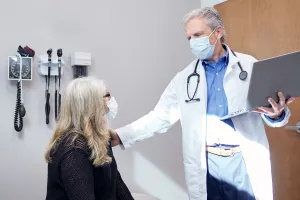Your primary care provider is your go-to expert for everyday health and wellness care. We treat people of all ages and conditions — from yearly check-ups to managing chronic conditions and preventive care to bumps, bruises, coughs, colds and everything in between.
Your partner in whole health
At Tufts Medicine, we’re challenging the one-size-fits-all approach to primary care by understanding you as a person, rather than a number in a system. Primary care doctors are often the first people to call when there’s a change in health, or to help you decide if you need to see a specialist and which one.
That’s why finding a primary care doctor you trust is so important. They record and remember your personal health history, family history, wellness goals and much more. So, if you're ever feeling under the weather, nursing an injury, ready for a check-up or just need to talk, we're the ones you call.

Conditions
Primary care doctors offer whole-person care for medical needs throughout one’s life, not just during bouts with specific diseases. You may visit your primary care doctor to:
- Ask questions about unusual health changes you are experiencing, such as headaches, back pain or a sensitive stomach
- Receive treatment for a common, acute (temporary) illness, such as a cold, sinus infection or the flu
- Receive ongoing care for chronic (long-term) conditions, such as diabetes, arthritis or high blood pressure
- Receive wellness and preventive health services, including annual physicals, check-ups, flu shots and other routine immunizations
If you’re feeling unwell, you can trust us to get you on the road to recovery as soon as possible. We can help with any short-term illness or condition that’s left you feeling under-the-weather, including:
Chronic + complex conditions
Primary care doctors often serve as a “home base” for patients with more complex medical needs. Chronic diseases require a lifetime of care, and we’re ready to be your partner through it all. We offer chronic disease management, including medication management, for conditions like:
- Asthma
- Arthritis
- Chronic kidney disease
- Diabetes
- Heart disease
- High blood pressure and high cholesterol
- Mental well-being
- Nutrition + wellness
And should your condition require care beyond day-to-day health, we'll refer you to a specialist, such as a gastroenterologist, cardiologist or gynecologist. They'll keep us in the loop of your progress and condition so we can be there for you and your health.
Testing
If it has been over a year since you last visited your primary care doctor, we recommend scheduling your next appointment. Even if you’re feeling healthy, your primary care doctor can perform evaluations to identify potential medical concerns early and help ensure you feel your best well into the future.
At your annual wellness appointment, you and your primary care doctor can discuss your lifestyle and health goals, and they’ll answer any questions you may have. We'll also address if social factors like food and transportation impact your health.
Routine screenings and physical exams help keep you on a healthy path, and may include:
|
|
Treatments
Primary care can cover many health and wellness needs. That means:
- Access to lab services
- Access to physical therapy
- Access to occupational therapy
- Counseling
- Diagnosis and treatment of common diseases, disorders and conditions
- Education and resources for living a healthy lifestyle
- Medication management, including anticoagulation management
- Preventive care
- Referrals to specialists
- Social work
- Yearly physical and check-up
Depending on your specific needs, some medical professionals can cover both your primary care and specialized treatments. Some examples include:
- Nurse practitioners are registered nurses with advanced medical training and can provide complete medical care.
- Obstetricians and gynecologists (also known as OBGYN) can provide primary care for women and assigned females at birth (AFAB).
- Pediatricians deliver primary care for children from birth through adolescence.
Choosing the right type of care
If something doesn’t feel quite right, it can be confusing figuring out what type of healthcare provider to see. Follow this as a general guide to ensure you’re getting the right type of care as quickly as possible.
When to see your primary care provider
If you or your family needs treatment for relatively minor problems such as sore throat, earaches and rashes or to manage chronic conditions like asthma and diabetes, try primary care first. They know your medical history and current medications best, and can give the most personalized care.
When to go to an urgent care center
Most primary care doctors provide urgent care services unless they're not available due to scheduling, time of day or location. You can call them first for advice. When they aren't available, you can visit an urgent care for issues that need immediate attention, like:
- Dehydration
- Mild allergic reactions
- Minor burns
- Minor eye injuries
- Illness
- Rash or hives
- Scrapes or lacerations
- Sprains or possible fractures
- Stings and bites
- Stitches for a minor cut
- Urinary tract infection (UTI) symptoms
When to seek emergency care
Visit an emergency department of the nearest hospital if you think you’re potentially in a life-threatening situation, such as chest pain, severe bleeding, difficulty speaking or breathing, are thinking of harming yourself or others, or experience major trauma. If at anytime you are need immediate medical care, call 911 or visit your closest emergency department, they are open 24 hours a day and 7 days a week for immediate help.
FAQs
Always seek emergency care if you fear loss of life, limb or vision. Go to the emergency room or call 911 immediately if you or someone around you has:
- Difficulty breathing
- Lost consciousness
- Sudden vision changes, confusion or trouble speaking
- A wound with uncontrolled bleeding
- Been involved in a motor vehicle accident, near-drowning incident or another traumatic event
Internal medicine and family medicine doctors are 2 of the most common primary care providers. So what’s the difference between them?
- Family medicine practitioners care for the entire family — infants, children, adults and older adults. They can even provide complete obstretrical care.
- Internal medicine doctors, also called internists, focus on treating adults.
Both MDs and DOs are licensed professionals who hold medical degrees from major universities and are qualified to address a wide variety of health concerns. The main difference between these 2 doctors is their approach to care. For example:
- MDs (also known as allopaths) take a more traditional approach to care that focuses on evaluating and addressing conditions through medicinal and surgical practices. Many MDs are medical specialists, such as cardiologists, gynecologists, endocrinologists, and rheumatologists.
- DOs take a holistic approach to care that considers mind, body, and spirit, often with natural remedies and limited medication. Many DOs serve as primary care doctors. Ask your DO if they offer manipulative medicine that's similar to a chiropractics.
Still, both of these doctors rely on scientifically proven conclusions to diagnose and treat patients and must meet the same rigorous standards to stay in practice.

From regular office visits to inpatient stays, find the healthcare you need and deserve close to home.

Meet the doctors and care team devoted to supporting you every step of the way along your path to better health.